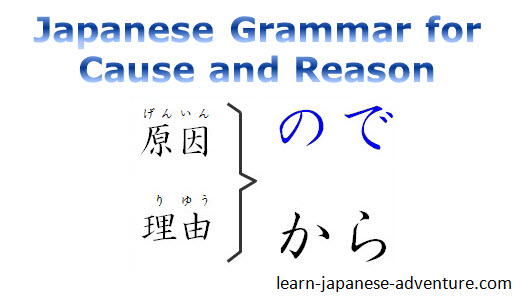- Home
- Intermediate Lessons
- Japanese Grammar Cause & Reason
Japanese Grammar for Cause and Reason -
Intermediate Lessons: 20
In this lesson, I will introduce another Japanese grammar for cause and reason - ので (node). It is similar to the other grammar から (kara) and both of them can be interchangeable in many occasions.

However, they are not exactly the same. There are some differences between these two grammars that you have to take note. In some situations it's better to use one over the other.
In the Learn Japanese FAQ Page, I have answered a question on how to use kara in Japanese for reason.
Like から (kara), ので (node) indicates cause or reason. While から (kara) subjectively presents a cause or a reason, ので (node) highlights a cause-and-effect relationship as a natural course of events.
As the use of ので (node) softens the view of the speaker and sounds more polite, it's often used when you are gently expressing a reason, when asking for permission or when making an excuse.
Sentence Patterns
Let's see the sentence patterns of Japanese grammar ので (node)...
| Verb | plain-form | ので |
| い-adj | plain-form | ので |
| な-adj | plain-form(~ |
ので |
| Noun | plain-form(~ |
ので |
The sentence patterns are quite similar to から (kara) except that for な-adj and Noun sentences, you need to replace だ (da) with な (na).
Examples of Japanese Grammar ので (node) and から (kara)
Let's use some examples to show when it's good to use ので (node) and when it's better to use から (kara) in a sentence.
Example 1
- 暑いので窓を開けてください。
atsui node mado wo akete kudasai
暑いから窓を開けてください。
atsui kara mado wo akete kudasai
Meaning: Please open the window since it's hot.
In the above example, since you are making a request, ので (node) is the better choice.
However, grammatically there is nothing wrong if you use から (kara). Only that it's best to use ので (node) in the example.
Example 2
- あの人はとてもきれいなのでモデルになれるでしょう。
ano hito wa totemo kirei na node moderu ni nareru deshou
あの人はとてもきれいだからモデルになれるでしょう。
ano hito wa totemo kirei da kara moderu ni nareru deshou
Meaning: The person may become a model since she is very pretty.
In the above example, から (kara) is the better choice because you are just saying what you are thinking and making a guess. There is no need to be polite in the the sentence.
Example 3
- 昨日はいい天気だったので公園へ散歩に行きました。
kinou wa ii tenki datta node kouen e sanpo ni ikimashita
昨日はいい天気だったから公園へ散歩に行きました。
kinou wa ii tenki datta kara kouen e sanpo ni ikimashita
Meaning: The weather was good yesterday, therefore I went for a walk at the park.
Again, in this example, you are talking about what you did yesterday. There is no need to be polite and hence から (kara) is the better choice.
Example 4
- 電車が止まったので授業に遅れました。
densha ga tomatta node jugyou ni okuremashita
電車が止まったから授業に遅れました。
densha ga tomatta kara jugyou ni okuremashita
Meaning: I was late for the lesson since the train was suspended.
In this case, it's better to use ので (node) because you are explaining to your teacher why you were late for the lesson. And you need to be polite while explaining your reason.
Example 5
- ここは駐車禁止なので車を止めてはいけません。
koko wa chuushakinshi na node kuruma wo tometewa ikemasen
ここは駐車禁止だから車を止めてはいけません。
koko wa chuushakinshi da kara kuruma wo tometewa ikemasen
Meaning: You cannot park the car because parking is prohibited here.
This is an order sentence and it need not to be polite. Therefore から (kara) is the better choice here.
Example 6
- 財布を忘れてしまったのでお金を貸してください。
saifu wo wasurete shimatta node okane wo kashite kudasai
財布を忘れてしまったからお金を貸してください。
saifu wo wasurete shimatta kara okane wo kashite kudasai
Meaning: Please lend me some money as I forgot my wallet.
In this example, you are borrowing money from someone so you have to be polite. ので (node) will be a better choice here.
Example 7
- ここはレストランなのでたばこを吸わないでください。
koko wa resutoran na node tabako wo suwanaide kudasai
ここはレストランだからたばこを吸わないでください。
koko wa resutoran da kara tabako wo suwanaide kudasai
Meaning: Please don't smoke here since this is a restaurant.
You are making a request for not to smoke in the restaurant, so it's best to ask politely. Therefore ので (node) is a better choice here.
Example 8
- もう遅いので早く寝なさい。
mou osoi node hayaku nenasai
もう遅いから早く寝なさい。
mou osoi kara hayaku nenasai
Meaning: Go to bed early because it's getting late.
This is normally an order which parents want their children to follow. There's no need to be polite. Therefore から (kara) is the better choice here.
Using Japanese Grammar ので node) with Polite-form
Although normally Japanese grammar ので (node) is used with Plain-form, it's not unusual to use it with Polite-form.
But most of the time it's used when you are talking or writing to customers and need to be very courteous. For example you may see this kind of notice in a shop...
- 今週の金曜日は休業させて頂きますのでご注意ください。
konshuu no kinyoubi wa kyuugyou sasete itadakimasu node go chuui kudasai
Meaning: As we will be closing on this Friday, please take note.
Related Pages
FAQ Page: How to use から (kara) in Japanese for reason.
Lesson 34: Particle de (で) for Cause or Reason.
Ready Set Speak Sale! Get up 40% OFF Forever Discount on Premium or Premium PLUS plan! Ends on 19 April 2024
The link above is an affiliate link, which means that I would earn a commission (at no extra cost to you) if you do end up purchasing the related learning course.
Previous - Lesson 19: Japanese Expression sou desu
Buy me a coffee








Facebook Comments
Don’t see the comments box? Log in to your Facebook account, give Facebook consent, then return to this page and refresh it.